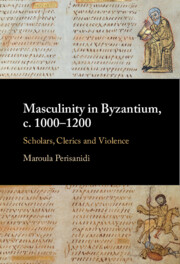Book contents
- Masculinity in Byzantium, c. 1000–1200
- Masculinity in Byzantium, c. 1000–1200
- Copyright page
- Contents
- Figures
- Acknowledgements
- A Note on Transliteration and Names
- Abbreviations
- Introduction
- Chapter 1 Michael Psellos
- Chapter 2 Ioannes Tzetzes
- Chapter 3 Gregorios Antiochos
- Chapter 4 Hunting Churchmen
- Chapter 5 Fighting the Good Fight
- Conclusions
- Bibliography
- Index
Chapter 3 - Gregorios Antiochos
Disabled Bodies and Desired Becomings
Published online by Cambridge University Press: 07 November 2024
- Masculinity in Byzantium, c. 1000–1200
- Masculinity in Byzantium, c. 1000–1200
- Copyright page
- Contents
- Figures
- Acknowledgements
- A Note on Transliteration and Names
- Abbreviations
- Introduction
- Chapter 1 Michael Psellos
- Chapter 2 Ioannes Tzetzes
- Chapter 3 Gregorios Antiochos
- Chapter 4 Hunting Churchmen
- Chapter 5 Fighting the Good Fight
- Conclusions
- Bibliography
- Index
Summary
Chapter 3 uses the letters of Gregorios Antiochos to explore the scholar’s body. Antiochos, who experienced chronic illness from a young age, combined his own bodily feeling with gender discourses to create a subversive image of the scholar which challenged ideals of military masculinity. He juxtaposed the strong body of the soldier, forged through physical exercise, to the frail body of the learned man hunched over his books, and declared his preference for the latter. He also expressed his own relationship with books and the furniture that facilitated his scholarly work, in disability terms: his cane, staff, armrest and guides. When at points the connection with scholarship was severed, Antiochos felt truly disabled. A body in crisis emerged that was assailed by unwanted becomings, prime among them the possibility of becoming-horse and losing his rationality. Despite this emphasis on reason, speech and self-determination, Antiochos’ letters present us with unexpected configurations of human and non-human bodies which blur the lines between organic and inorganic and help decentre man. In doing so, they posit the Eastern Roman scholar with his books and study furniture as a kind of antipode to the Western knight and his horse.
Keywords
- Type
- Chapter
- Information
- Masculinity in Byzantium, c. 1000–1200Scholars, Clerics and Violence, pp. 73 - 102Publisher: Cambridge University PressPrint publication year: 2024

